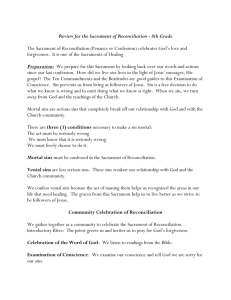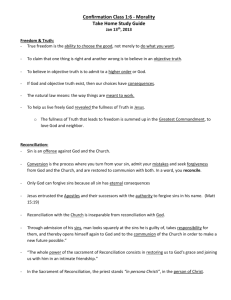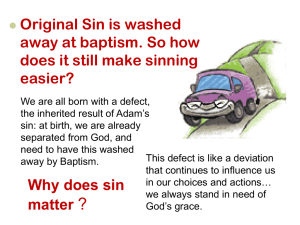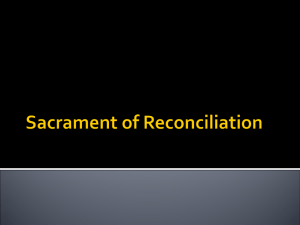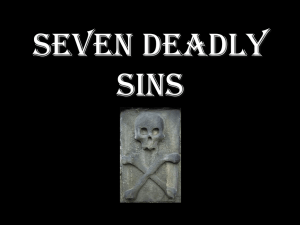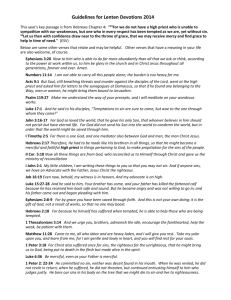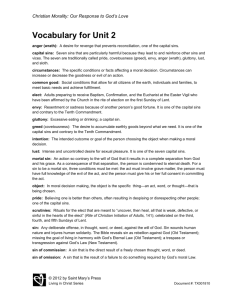InfoPack
advertisement
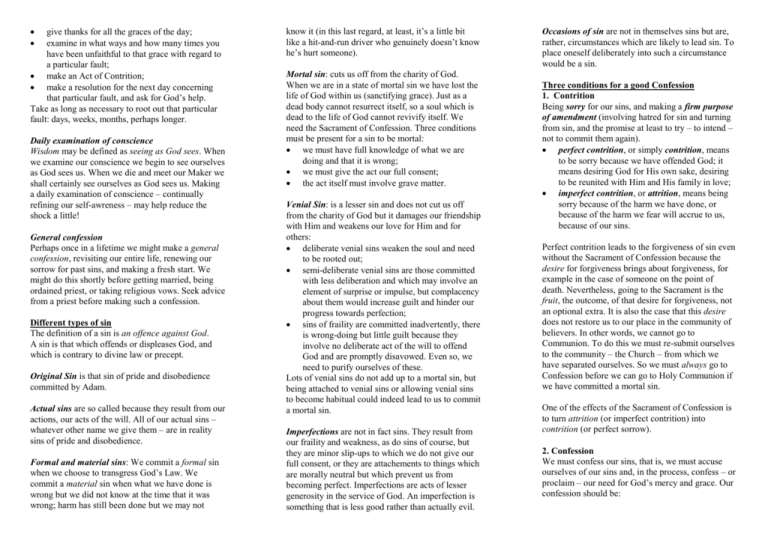
give thanks for all the graces of the day; examine in what ways and how many times you have been unfaithful to that grace with regard to a particular fault; make an Act of Contrition; make a resolution for the next day concerning that particular fault, and ask for God’s help. Take as long as necessary to root out that particular fault: days, weeks, months, perhaps longer. Daily examination of conscience Wisdom may be defined as seeing as God sees. When we examine our conscience we begin to see ourselves as God sees us. When we die and meet our Maker we shall certainly see ourselves as God sees us. Making a daily examination of conscience – continually refining our self-awreness – may help reduce the shock a little! General confession Perhaps once in a lifetime we might make a general confession, revisiting our entire life, renewing our sorrow for past sins, and making a fresh start. We might do this shortly before getting married, being ordained priest, or taking religious vows. Seek advice from a priest before making such a confession. Different types of sin The definition of a sin is an offence against God. A sin is that which offends or displeases God, and which is contrary to divine law or precept. Original Sin is that sin of pride and disobedience committed by Adam. Actual sins are so called because they result from our actions, our acts of the will. All of our actual sins – whatever other name we give them – are in reality sins of pride and disobedience. Formal and material sins: We commit a formal sin when we choose to transgress God’s Law. We commit a material sin when what we have done is wrong but we did not know at the time that it was wrong; harm has still been done but we may not know it (in this last regard, at least, it’s a little bit like a hit-and-run driver who genuinely doesn’t know he’s hurt someone). Mortal sin: cuts us off from the charity of God. When we are in a state of mortal sin we have lost the life of God within us (sanctifying grace). Just as a dead body cannot resurrect itself, so a soul which is dead to the life of God cannot revivify itself. We need the Sacrament of Confession. Three conditions must be present for a sin to be mortal: we must have full knowledge of what we are doing and that it is wrong; we must give the act our full consent; the act itself must involve grave matter. Venial Sin: is a lesser sin and does not cut us off from the charity of God but it damages our friendship with Him and weakens our love for Him and for others: deliberate venial sins weaken the soul and need to be rooted out; semi-deliberate venial sins are those committed with less deliberation and which may involve an element of surprise or impulse, but complacency about them would increase guilt and hinder our progress towards perfection; sins of fraility are committed inadvertently, there is wrong-doing but little guilt because they involve no deliberate act of the will to offend God and are promptly disavowed. Even so, we need to purify ourselves of these. Lots of venial sins do not add up to a mortal sin, but being attached to venial sins or allowing venial sins to become habitual could indeed lead to us to commit a mortal sin. Imperfections are not in fact sins. They result from our fraility and weakness, as do sins of course, but they are minor slip-ups to which we do not give our full consent, or they are attachements to things which are morally neutral but which prevent us from becoming perfect. Imperfections are acts of lesser generosity in the service of God. An imperfection is something that is less good rather than actually evil. Occasions of sin are not in themselves sins but are, rather, circumstances which are likely to lead sin. To place oneself deliberately into such a circumstance would be a sin. Three conditions for a good Confession 1. Contrition Being sorry for our sins, and making a firm purpose of amendment (involving hatred for sin and turning from sin, and the promise at least to try – to intend – not to commit them again). perfect contrition, or simply contrition, means to be sorry because we have offended God; it means desiring God for His own sake, desiring to be reunited with Him and His family in love; imperfect contrition, or attrition, means being sorry because of the harm we have done, or because of the harm we fear will accrue to us, because of our sins. Perfect contrition leads to the forgiveness of sin even without the Sacrament of Confession because the desire for forgiveness brings about forgiveness, for example in the case of someone on the point of death. Nevertheless, going to the Sacrament is the fruit, the outcome, of that desire for forgiveness, not an optional extra. It is also the case that this desire does not restore us to our place in the community of believers. In other words, we cannot go to Communion. To do this we must re-submit ourselves to the community – the Church – from which we have separated ourselves. So we must always go to Confession before we can go to Holy Communion if we have committed a mortal sin. One of the effects of the Sacrament of Confession is to turn attrition (or imperfect contrition) into contrition (or perfect sorrow). 2. Confession We must confess our sins, that is, we must accuse ourselves of our sins and, in the process, confess – or proclaim – our need for God’s mercy and grace. Our confession should be: clear – no waffle; sincere – no hiding or excusing; humble – an accusation of guilt against self; prudent – not confessing others’ sins; entire – mention all mortal sins, how many times they were committed, and all (and only) those circumstances which might affect the level of guilt. A good Confession will also include venial sins and, perhaps, imperfections. 3. Satisfaction We must make satisfaction for our sins by doing penance, and “in my flesh I complete what is lacking in Christ’s affliction” (Col 1:24). A good Confession always remits (cancels) the eternal punishment due to sin (in other words, hell) but not always all of the temporal punishment (the punishment that only lasts for a while). If there is punishment still due to us when we die – if we have not carried our share of the weight of the Cross like Simon of Cyrene – then we will spend time in purgatory. The penance helps to expiate (make amends for) our sins and remit some or all of the temporal punishment. The penance is also intended to excite our desire for God and to heal our broken friendship with Him; to assure Him, as it were, that we desire to love Him. If we fail to do our penance, our sins would still have been forgiven (the Sacrament would still be valid), but deliberately to neglect the penance would be a sin and should be confessed next time. The life of virtue A habit is a disposition of the soul or mind. If someone is disposed towards patience, he has the habit of patience; if towards laziness, he has the habit of laziness. Good habits are called virtues; bad habits, vices. A virtue is something that makes it easier to do the things we should do. A vice is something that makes it harder not to do the things we shouldn’t do. Confession is one of the best means available of turning a bad habit into a good habit. Repeatedly... confessing the same sins, opening the heart to God’s forgiveness and grace receiving the strength to resist temptation, seeking God’s guidance and illumination, and persevering in good resolutions, all help to reduce the hold a vice may have over us and turn our hearts towards God instead. Confessing a new sin before it has time to become a habit is a powerful corrective. Grace and good resolutions Grace does not work in a vacuum; it elevates and perfects nature. In other words, God takes what we give Him, and He uses His grace to build on our good resolutions, our intentions and our efforts, in order to purify and sanctify them. Detachment Bit by bit we need to become detached from anything and everything (including stubbornly held opinions) that keeps us at arm’s length from God so that, eventually, everything we do is motivated by our love for Him and by our willingness to do His will. In other words we need to free our hearts from creatures (the things and even the people that God has created) in order to become attached solely to the Creator. “For where your treasure is, there will your heart be also” (Mt 6:21). * “The great thing is to become saints,” said St Philip, but he also said, “You cannot become a saint in four days”. A Good Confession Why confess to a priest? Our Lord gave the power to forgive sins to His priests (Jn 20:22-23); in order to re-submit to the authority of God and the Church which we have betrayed by our sins, and to be re-admitted to that community (that oneness of Faith symbolized by the Holy Eucharist, the Sacrament of Unity) from which we have cut ourselves off by mortal sin; because Confession is not purely about the individual and God but about our relationship with others also, and about re-establishing the harmony of a created order shattered by sin; because the priest is the representive of the Christian community, the Church; in Confession it is harder to sweep things under the carpet, or to justify and excuse our faults; to benefit from the psychological release of naming our sins; to benefit from spiritual direction or counsel. What is conscience? Blessed John Henry Newman described it as a law of the mind; a messenger of Him who... speaks to us behind a veil; the aboriginal Vicar of Christ. To examine our conscience is to identify ways in which we have been unfaithful to God’s grace, to His law, to His Word. General examination In a general examination of conscience we examine ourselves with regard to all aspects of our lives making use, for example, of the Ten Commandments. Particular examen A particular examen is a useful tool for tackling a particular, persistent fault. Each evening, instead of making a general examination of conscience (which you would still need to do immediately before going to Confession), try the following:
